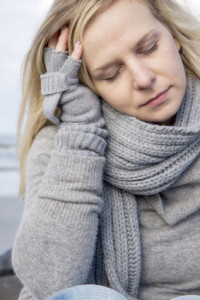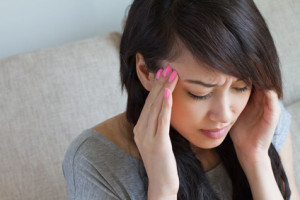- Calls to this hotline are currently being directed to Within Health, Fay or Eating Disorder Solutions
- Representatives are standing by 24/7 to help answer your questions
- All calls are confidential and HIPAA compliant
- There is no obligation or cost to call
- Eating Disorder Hope does not receive any commissions or fees dependent upon which provider you select
- Additional treatment providers are located on our directory or samhsa.gov
Body Image and Social Anxiety
Contributor: Leigh Bell, BA, writer for Eating Disorder Hope
 We’ve probably all been there. A huge zit surfaced on the tip of your nose. You burned your forehead with the curling iron. Or you’re just feeling blah about your looks and not in the mood go anywhere but the living-room couch. It’s nothing major. You’ll get over it, but some people feel this way more often than not.
We’ve probably all been there. A huge zit surfaced on the tip of your nose. You burned your forehead with the curling iron. Or you’re just feeling blah about your looks and not in the mood go anywhere but the living-room couch. It’s nothing major. You’ll get over it, but some people feel this way more often than not.
Social anxiety is the extreme fear of being scrutinized and judged by others in social or performance situations.
It’s not “shyness” or the occasional staying-home-because-I-feel-insecure. Social anxiety can inhibit someone’s life, work, and relationships, and for about 15 million Americans, the problem is severe enough to be diagnosed a social anxiety disorder, according to the Anxiety and Depression Association of America (ADAA).
Empty Experiences and Social Anxiety
People with social anxiety disorder “may have few or no social or romantic relationships, making them feel powerless, alone, or even ashamed,” the association reports. Without someone in your life to share the experiences, the experiences often seem empty, and these feelings feed any type of social anxiety issues.
Body image plays a consequential role in social anxiety and several other diagnoses that include, as a symptom, the fear of judgment based on one’s appearance. Negative body image is linked to:
- Obsessive-compulsive disorder
- Panic disorder
- Social physique anxiety
- Body dysmorphic disorder (BDD)
What Is Body Dysmorphic Disorder?
 BDD is characterized by persistent and intrusive preoccupations with an imagined or slight defect in one’s appearance, according to the ADAA. People with body dysmorphic disorder experience high levels of social anxiety because they are worried what other people will think of them1.
BDD is characterized by persistent and intrusive preoccupations with an imagined or slight defect in one’s appearance, according to the ADAA. People with body dysmorphic disorder experience high levels of social anxiety because they are worried what other people will think of them1.
The same study links social anxiety to someone’s negative perception of themselves, even if not drastic enough to qualify for a BDD diagnosis. For example, people who think they’re unattractive tend to have more social anxiety, and negative body image can cause greater social introversion.
Social Physique Anxiety
Social physique anxiety, a diagnosis coined in 1989, is a subtype of social anxiety in which somebody feels they’ll be judged by others on their physique or physical self. Social physique anxiety groups together the low-body-image symptoms into one diagnosis. Research shows females more than men experience a greater amount of social physique anxiety, and this is consistent from a relatively young age2.
“These findings are important in that they provide information that concern over the presentation of the body in physical situations is elevated in females after early adolescence,” according to the study.
Body Image Problems Tend to Lead to Social Anxiety Problems
While it can be difficult to distinguish between the official diagnoses regarding body image and social anxiety, the truth is when you’re not feeling good about yourself, you’re more reluctant to socialize and to seek out relationships.
Some concerns about body image aren’t unusual. We are all human, and our nature is to focus on the imperfections, rather than seek our perfections. Yet, body-image concerns can affect our ability to be fully present in our relationships.
Self-Consciousness and Intimacy Problems
 More than half of women have avoided or postponed sex, even when they were “in the mood,” because they were too self-conscious about the way their body looked to their partner3.
More than half of women have avoided or postponed sex, even when they were “in the mood,” because they were too self-conscious about the way their body looked to their partner3.
Body image and intimacy create a push-pull relationship. Women happy with their bodies are more likely to be in a fulfilling relationship, and when a woman is in a satisfied relationship they tend to be “fine with their weight and body image.”4
The study found women with a higher body-weight satisfaction, tend to have higher satisfaction in relationships.
Body image is a very personal issue. It doesn’t matter how much one weighs, how good someone looks. Positive body image is deeper than a scale or a mirror; feeling good about oneself is a journey within oneself.
Community Discussion – Share your thoughts here!
What has been your experience with body image? Have you worked to improve your body image within your journey to recovery? What steps have you taken to improve your body image?
About the Author:
Leigh Bell holds a Bachelor of Arts in English with minors in Creative Writing and French from Loyola Marymount University in Los Angeles. She is a published author, journalist with 15 years of experience, and a recipient of the Rosalynn Carter Fellowship for Mental Health Journalism. Leigh is recovered from a near-fatal, decade-long battle with anorexia and the mother of three young, rambunctious children.
References:
- Pinto, A., and Phillips, K. (2005). Social anxiety in body dysmorphic disorder. Body Image, 2(4), 401–405.
- Hagger, M., & Stevenson, A. (2010). Social physique anxiety and physical self-esteem: Gender and age effects. Psychology & Health, 25(1), 89-110.
- Woertman, Liesbeth, and Femke van den Brink. “Body Image And Female Sexual Functioning And Behavior: A Review.” Journal of Sex Research 49.2/3 (2012): 184-211
- Thompson, D. (2013, December 5). Good Body Image Goes Hand in Hand With Happier Relationship. Retrieved June 17, 2015.
Last Updated & Reviewed By: Jacquelyn Ekern, MS, LPC on July 1st, 2015
Published on EatingDisorderHope.com

